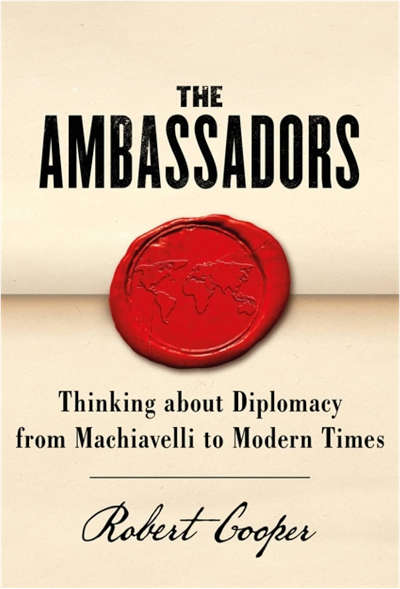In the picture
Cover of Robert Cooper's book 'The Ambassadors. Thinking about Diplomacy from Richelieu to Modern Times' (London: Weidenfeld & Nicholson, 2021) 563 pp.
Diplomats are people who solve problems through negotiation and cooperation. In formulating this definition, Robert Cooper, a British diplomat, today advisor in the European Union, writes "co-operation"; although it is also an English option for that word, the inclusion of the hyphen underlines what the author wishes to emphasize: the initiative of the parties, in an intense search for common points that allow a agreement. Cooper presents his book as a story about "pieces of paper that saved lives". Thus, he dwells on the negotiation of the treaties that made it possible to end wars and close other international crises, from the negotiations on the European order that followed the fall of Napoleon or those that set in motion the Marshall Plan and the Schuman Declaration to those that eventually led to the fall of the Berlin Wall. And it is an account of the negotiations based on their main protagonists; at one point, Cooper calls them "heroes": people who were not always virtuous but who, moved by a reason of state (here we find Machiavelli, Richelieu and Talleyrand, as well as the more exemplary Kennan, Monnet and Adenauer, among others), contributed ideas and effort to the resolution of conflicts.
The Ambassadors' includes the fine print of many negotiations, sometimes in the form of a 'thriller': it places us in the palace or the hotel where they take place and gives us the information that each time the parties handle. Sometimes towards the end of the chapters he makes some general considerations, although without wanting to draw lessons, since the reader already understands where the mistakes or successes of the different negotiators were in each process. Only in the last chapter does he move from the concrete to the universal.
In these conclusions, Cooper marvels that NATO's article 5, more vague in the formulation of mutual defense than so many previous treaties agreed between two or more nations over the centuries, has nevertheless been much more effective. He believes this is due to organizational or formal aspects of the treaty (multilateralism, no deadline, not limited to a specific threat, institution-building that allows for a permanent contact), to the democratic reality of the countries and to the "indispensable" leadership of the United States.
A self-confessed Europeanist, he defends the convenience of the EU with Adenauer's observation, referring to Germany's commitment to European construction, that being alone brings out the worst in countries. In this context, he affirms that the Brexit - about which there is an epilogue in the book - was due to the deterioration of British democracy, which has detrimental mechanisms, such as the electoral system and the inadequacy of the House of Lords.
Cooper is especially opposed to that isolationism for which countries sometimes opt. "First there was peace through empire; then peace - or rather limits to war - through balance; then there was peace through separation" [of blocs], "the liberal order brings peace through cooperation: a system of consent and consensus that offers freedom and peace", he writes. He adds, "The multilateral order changes everything. One state on its own is isolated. With two states, the relationship will be transactional - the art of attention- or there may be a conspiracy against a third. Three is the magic issue . When three or more states meet, there is transparency and most likely rules, written or unwritten. At least there will be procedurerules."
The art of diplomacy, Cooper stresses, involves an attitude of restraint, which in turn presupposes a deep knowledge knowledge of the country with which you are negotiating. "You have to know the other side. It requires people who understand their language, their history and their culture, who understand their ambitions and their apprehensions," he warns. And that is what the author appreciates in the list of diplomats - mostly foreign ministers of their countries, but also some heads of government and ambassadors - he deals with, in which, in addition to those already mentioned, Ernest Bevin, George Marshall, Dean Acheson, Henry Kissinger, Willy Brandt, Helmut Kohl... stand out. Diplomacy of the great powers, but also, as sample button of its importance also for the small ones, of countries such as Denmark and Finland, which historically have not had it easy with Germany and Russia, respectively.

